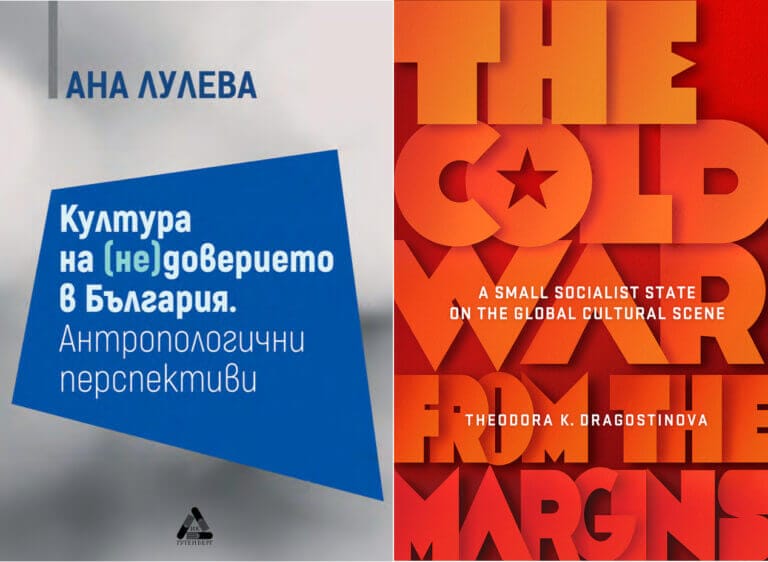
We are pleased to announce that two authors are the winners of the John D. Bell Memorial Book Prize in 2023 for their outstanding publications in the field of Bulgarian Studies. The winners are:
Ana Luleva for her book Култура на (не)доверието в България. Антропологични перспективи, Sofia (Gutenberg Publishing House), 2021
Theodora Dragostinova for her book, The Cold War from the Margins: A Small Socialist State on the Global Cultural Scene, Ithaca and London (Cornell University Press), 2021
Congratulations to the winners and their publishing houses!
The Award Committee wrote in support of their choice for winners:
Ana Luleva’s book
“Ana Luleva’s book The Culture of (Dis)Trust in Bulgaria is an important and valuable contribution to Bulgarian studies that deserves to be widely read. Luleva’s monograph stands out for its historically situated anthropological approach ranging across supposed points of rupture—the consolidation of the Bulgarian state (and population transfers) after World War I; the revolutionary period after World War II; and the changes of 1989. This chronological depth and “thick description” in uncovering the social worlds found at the intersection of state and society, notions of public, and private and competing ideas of the “good society” is compelling. Luleva’s research is thorough, involving a truly impressive range of sources. It is an outstanding book.”
“…one of the contributions of the book is in its analysis of trust/distrust as a dynamic phenomenon that reveals hidden dimensions in the relationships among people and between people and institutions. The level of propaganda and misinformation in Bulgarian society amplified during the Covid pandemics and the war in Ukraine makes this book very timely and essential for adopting a balanced and informed view on collective memory and identity…The book is relevant to the field of Bulgarian Studies, but it also transcends its boundaries to offer a more universal understanding of the interpersonal, institutional and political levels of distrust..”
“Taking impetus from pertinent debates in anthropology and sociology on the levels of trust and distrust in contemporary societies, the book makes an excellent use of existing theories in its in-depth analysis of Bulgarian culture in historical and contemporary perspectives. It combines a wide range of approaches and methods from a variety of disciplines (anthropology, sociology, history, political studies, ethnology, social psychology, etc.) and provides contributions to each of these fields…The book relies on impressive sets of sources and is an outstanding achievement in the field of Bulgarian studies – I strongly believe it will be translated and published in English language too and will attract the attention of reading audiences worldwide.”
Theodora Dragostinova’s Book
“Dragostinova’s Cold War from the Margins is an important contribution to the history of late socialism in Bulgaria and the global cold war that stands out for the originality of its research and the quality of its writing. Cold War from the Margins does situate Bulgarian studies within larger global conversations (and as such to raise the profile of the field)—tracing out relationships between Bulgarian state institutions and cultural figures with their counterparts in Japan, Mexico, the United States, India and Nigeria. In short, Dragostinova convincingly makes the case for why Bulgaria matters (not that we need to be told).”
“The book is a timely contribution to our understanding of the dynamics in the relations between Bulgaria and Soviet Russia. Readers familiar with the existing division in the Bulgarian society over the war in Ukraine will benefit from Dragostinova’s thorough and insightful discussion of the role of Soviet Russia in Bulgarian internal and external affairs in the 1970s, as well as its impact on Bulgaria’s relations with its neighbors…the book could be informative also for policy makers and cultural organizations that are working towards promoting Bulgarian cultural programs abroad.”
“Focusing on the international exposure of Bulgaria during 1970s and on the country’s involvement in world cultural policies, Theodora Dragostinova’s book presents us with a thorough and fascinating study of international relationships during the Cold War period. The book is outstanding in many respects. Of primary importance among them is its extremely original analytic standpoint – one of analyzing the Cold War dynamics through the cultural policies embraced by a small state of the socialist bloc, of tracing interactions with “third world” countries, yet putting the factor of culture in the center of these politics. No less impressive is the solid set of arguments that the author develops and the wealth of sources from different social and cultural contexts. The analysis succeeds in placing Bulgaria and other countries “in the margins” into the center of the debates about global politics – a point that holds special pertinence until today.”
